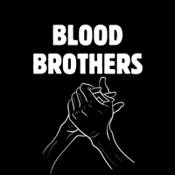
Overview
Synopsis
Set in Liverpool from the 1960s through the early 1980s, Blood Brothers tells the story of twin boys, Mickey and Edward. Their mother, Mrs. Johnstone, is already struggling to raise seven children when she discovers she is expecting twins. Unable to afford to keep them both, she makes a desperate pact with her wealthy employer, Mrs. Lyons, agreeing to give one baby away. Edward is raised in comfort and privilege, while Mickey grows up in poverty, shaped by the struggles of working-class life. Separated at birth and unaware of their true connection, the boys lead very different childhoods in the same city.
At the age of seven, Mickey and Edward meet by chance, discovering that they share a birthday. They immediately become close friends, swearing to be “blood brothers,” yet neither knows they are, in fact, real brothers. Their bond stays strong into adolescence, even as both develop feelings for Mickey’s neighbor and childhood friend, Linda. As the years pass, however, the class divide between them becomes harder to ignore. Edward follows an easier path through education and opportunity, while Mickey faces unemployment, crime, and personal struggles. Eventually, the truth of their shared parentage is revealed, leading to a shocking climax in which both brothers die—fulfilling the tragic destiny hinted at throughout the play.
Show Information
Context
Originally produced as a high school play in 1981, Willy Russell subsequently adapted the play into a musical and it premiered at the Liverpool Playhouse in 1983 with Barbara Dickson as Mrs Johnstone and Andrew Schofiend as the Narrator. The show then transferred to the West End and ran from April to October 1983 at the Lyric Theatre. This production won the Olivier Awards for Best Musical and Best Actress in a Musical (Barbara Dickson).
After two UK tours in 1984 and 1987, Blood Brothers
to read the context for Blood Brothers and to unlock other amazing theatre resources!Plot
Act One
The musical opens with the bodies of Mickey and Edward lying on stage. The Narrator delivers the prologue, explaining that the men were twins who were separated at birth. He invites the audience to judge their mother’s guilt (Mrs Johnstone) for her role in their deaths.
Mrs Johnstone, a working-class mother of seven children, discovers that she is pregnant with twins shortly after her husband left her for another woman (“Marilyn Monroe”). She shares her plight with her employer,
to read the plot for Blood Brothers and to unlock other amazing theatre resources!Characters
| Name | Part Size | Gender | Vocal Part |
|---|---|---|---|
|
Lead |
Female |
Alto |
|
|
Lead |
Male |
Baritone |
|
|
Lead |
Male |
Tenor |
|
|
Lead |
Male |
Tenor |
|
|
Supporting |
Male |
Tenor, Baritone, Bass |
|
|
Supporting |
Female |
Soprano, Mezzo-Soprano, Alto |
|
|
Supporting |
Female |
Mezzo-Soprano |
|
|
Featured |
Male |
Tenor, Baritone, Bass |
|
|
Ensemble |
Either Gender |
Soprano, Mezzo-Soprano, Alto, Tenor, Baritone, Bass |
Songs
Act One
Act Two
A song with an asterisk (*) before the title indicates a dance number.
Monologues
Scenes
Key Terms
An adaptation is a reworking of a story from one medium or cultural context into another, such as turning a novel into a play or updating a classic play’s setting. Adaptations often reinterpret themes, characters, and style for new audiences. They can range from faithful recreations to bold reimaginings.
A low female vocal range used in opera and musical theatre, often assigned to mature or dramatic roles.
A ballad is a song style that tells a story through simple, lyrical verses and a steady rhythm. In theatre, ballads are often slow and emotional, allowing characters to reveal deep feelings or reflect on personal journeys. They can be used to highlight romance, longing, or moments of dramatic intensity.
A mental health condition portrayed in theatre to explore emotional depth, realism, and character struggle.
A character or voice that tells part of the story, offering commentary or background. Narrators are frequently used in children’s theatre and epic productions.
A regional British dialect associated with Liverpool, often used in theatre to convey authenticity or working-class identity.
A production created to showcase the talents of a specific star performer, often tailored to their strengths.
A Tragedy is a form of drama that explores human suffering, conflict, and loss, often leading to a disastrous or fatal conclusion. Traditionally, the main character experiences downfall due to a personal flaw, poor judgment, or forces beyond their control. Tragedy aims to evoke pity and fear in the audience, leading to reflection and emotional release.
Videos
Quizzes
Themes, Symbols & Motifs
THEMES
Class and Social Inequality
One of
to read about the themes, symbols and motifs from Blood Brothers and to unlock other amazing theatre resources!Quote Analysis
_“Do we blame superstition for what came to pass, or
to read our analysis of select quotes from Blood Brothers and to unlock other amazing theatre resources!